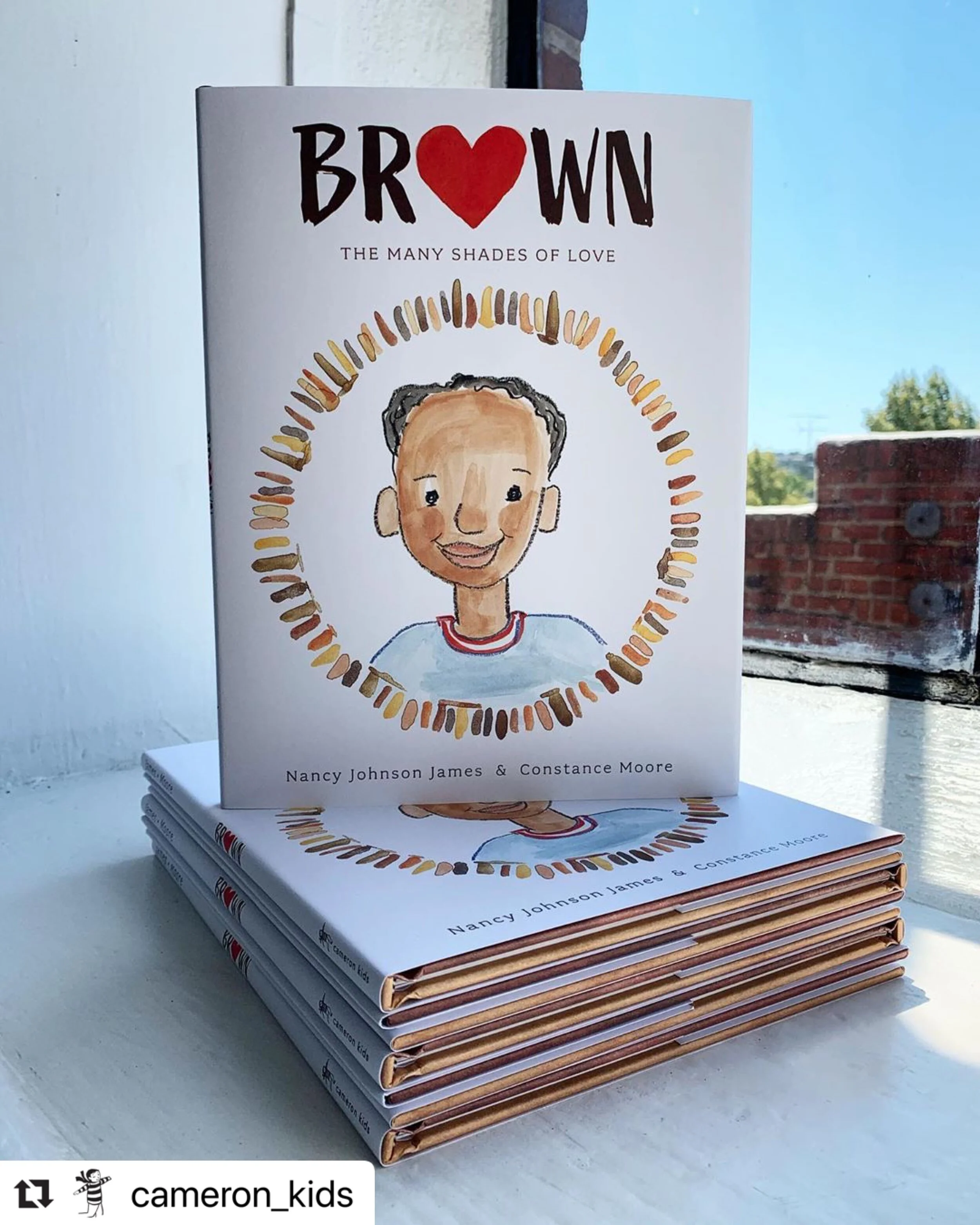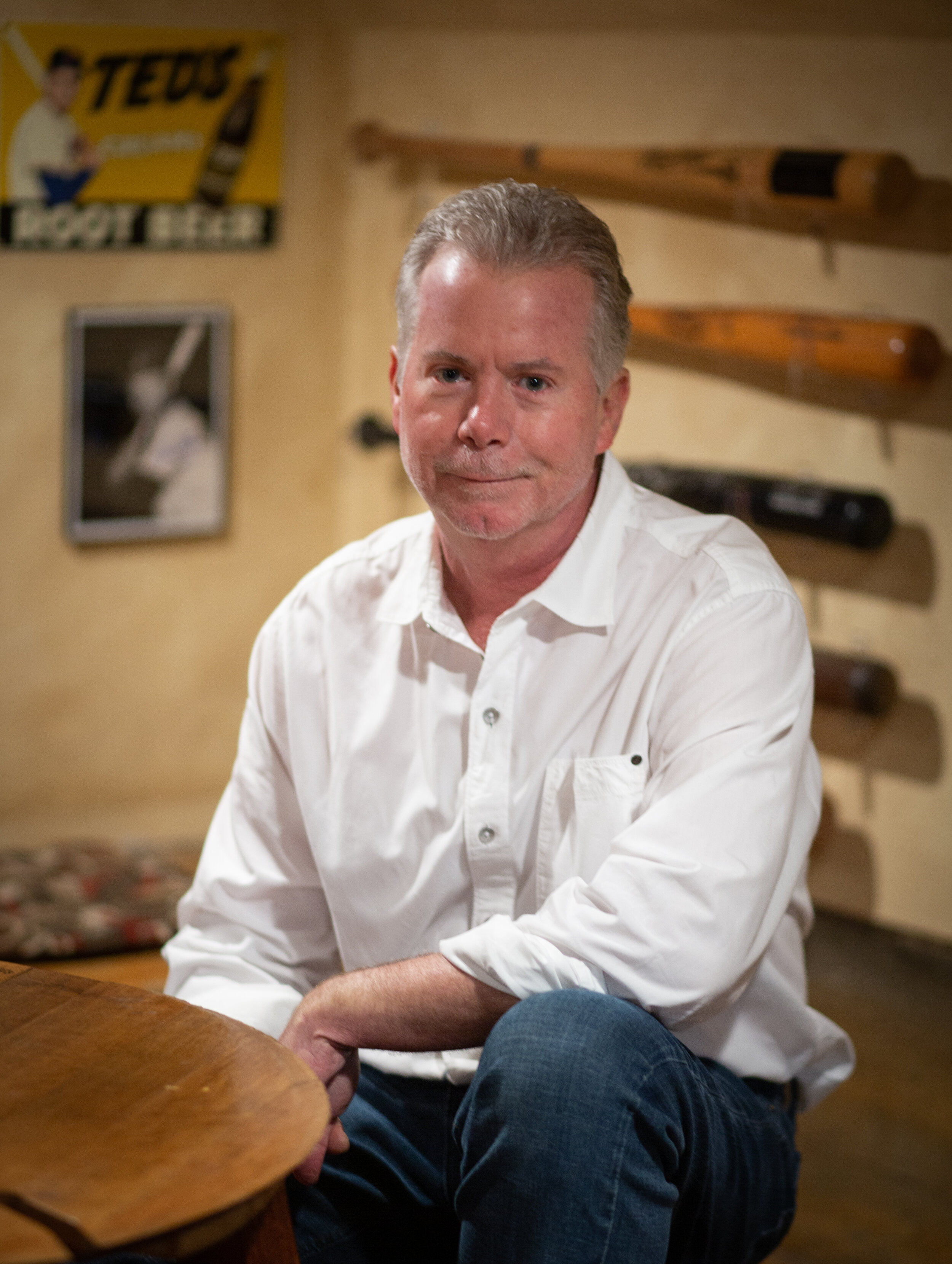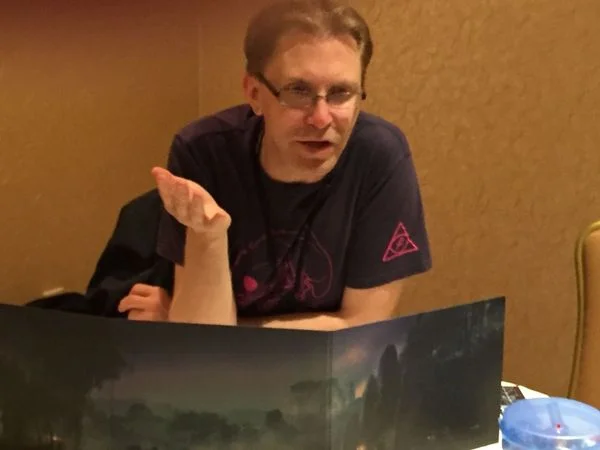Creator, Performer, and Audience: Interview with Christopher Smith Adair
Christopher Smith Adair is a freelance writer of role-playing games and sometime copyeditor living in San Diego. When I asked Christopher to describe role-playing games (RPGs), they said, “Those are the collaborative games in which players bring creativity and randomness together to create an emergent narrative…oh, and have social fun.”
Christopher has mostly written for Call of Cthulhu, a game of supernatural mystery and horror based on the fiction of H. P. Lovecraft and his literary peers and disciples. Christopher’s first book, A Cold Fire Within, is forthcoming from Chaosium, Inc. for the Pulp Cthulhu game.
I went to high school with Christopher, so we probably met around the time they started playing RPGs in 1982. They began writing for RPGs in 2002, after answering an open call for pitches on the Strange Aeons email list. Their work has appeared in such places as Doors to Darkness, New Tales of the Miskatonic Valley, the Arkham Gazette, and Worlds of Cthulhu magazine.
Kristy Lin Billuni: Tell us about A Cold Fire Within.
Christopher Smith Adair: The adventure starts in 1930s New York with a missing-persons case and continues through time and space as the players uncover a globe-threatening plot.
KLB: So it’s a part of the greater game?
CSA: Yes, It’s a campaign, a continuing storyline designed to be played over months.
KLB: What sets it apart from other campaigns in the Call of Cthulhu world?
CSA: It’s an opportunity to visit some corners of Lovecraft’s worlds that are usually only hinted at in the game.
KLB: Congratulations! How does it feel to have your first book being published?
CSA: This is my first book as sole author, as well as my first time writing anything for a campaign. It’s definitely a milestone in my career. Now that I know I can meet that challenge, I want to see what else I’m capable of.
KLB: Great. What’s next?
CSA: The next thing I want to tackle is designing my own rules and setting, either publishing it myself or working with a publisher. That’s more than a little terrifying, but I want to try. I have a few ideas, and it will also be good to stretch beyond the horror genre.
KLB: Tell me more about your passion for this kind of writing.
CSA: RPG writing is the medium I work in for a few reasons. I was immediately attracted to the challenge. It’s a combination of fiction, nonfiction, and instructional manual, and you have to balance all of that. And what you have written is only a guideline. It’s up to the players to fully form it, often in ways you could never imagine.
KLB: So your role as writer expands--maybe in the way a playwright’s role expands beyond writing? Or the way a playwright hands over the script and then other artists have their way with it?
CSA: Yes, all narratives are interactive to some extent. We bring our unique perspectives to them, and we imagine what came before and after. Role-playing games foreground that and build off of it. We are creator, performer, and audience all at once.
KLB: So many writers have a story to tell but haven’t found the right platform or genre for the work or for their identity as an artist.
CSA: This type of writing also fits my personality better than standard fiction does. I don’t really have a binary view of the world. Why have one perspective or set of answers? It’s also about giving up control.
KLB: So the book is coming out soon. Are you working on something new in the meantime?
CSA: Right now, I’m revising or waiting to revise a few different projects for various publishers.
KLB: Can you tell us about one?
CSA: The one I just finished takes place after the apocalypse. Usually I get to write about things that could cause the end of the world, so it’s exciting to explore life after the collapse.
KLB: Post-apocalypse stories are really hot right now.
CSA: I’ve decided life would be bizarre and dreamlike, drawing inspiration from Expressionist film, Franz Kafka’s fiction, and Edvard Munch’s art. The player characters are a circus troupe, which is a premise I’ve wanted to use for years.
KLB: I love it. That’s so totally different from anything I’ve seen, and I think you’re right. The post-apocalyptic future will be surreal. I usually ask writers what they’re reading, but I get to ask you, what are you playing?
CSA: Right now, I’m excited to be playing Avery Alder’s Monsterhearts, a queer paranormal teen romance game. Playing a confused, hormonal teenager who makes bad decisions is much more fun than it was to actually be one.
KLB: I knew that teenager! I’m so glad I get to know you as an adult writer and tastemaker too. What else?
CSA: Jason Morningstar’s Fiasco, a game about desperate, doomed people like you see in a Coen Brothers film, is probably my favorite game design. I recommend it to anyone who wants a quick introduction to narrative games, especially writers and improv actors. Some writing and theater groups have used its constraints as an inspirational tool.
KLB: I want to get into how you accomplish the writing you do. Let’s start with time. When do you write?
CSA: I work full time, so it’s a lot of finding time where I can.
KLB: Most writers I know have day jobs, so this is really relevant. How do you get a whole book written when you work?
CSA: I naturally wake up earlier than I need to, so sometimes I write a bit before my day job. I rarely write on weeknights, except for minor mechanical matters like formatting, tweaking text in a way that I’ve already decided on, or editing or revising.
KLB: So what do your weekends look like?
CSA: I mostly write on the weekends, sometimes starting almost as soon as I’m awake or easing into it after an hour or two. A lot depends on where I’m at in the process, including how close I am to my deadline. Even when I’m only really writing on the weekend, I’m usually thinking about it throughout the week when my mind isn’t otherwise fully engaged.
KLB: Right. So even when you’re not writing you’re writing. What are some of the things you have figured out before you write?
CSA: Before I start writing a pitch or the actual piece, I’ll have figured out basic plot or structure before sitting down properly. And throughout the process, I’ll send myself quick emails with questions I pose to myself or answers to puzzles I’ve been trying to solve.
KLB: And where do you write?
CSA: My writing space is far from ideal. I work on a desktop in the living room, right next to the television.
KLB: Oh wow, so you’re chained to that spot?
CSA: That’s one reason for early morning writing. It helps that my partner is a late riser typically.
KLB: So many writers get hung up on the “room of one’s own” thing, but many of us do not have dedicated space. How do you handle the distractions around you?
CSA: I’m grateful that I can write while listening to music. The music doesn’t need to have anything to do thematically with what I’m writing, and vocals don’t bother me.
KLB: Lyrics are a thought killer for me. How do you do that?
CSA: I mostly tune it out, but it anchors my distractible mind much more than if everything was silent. I can’t handle outright talking, like DJs or podcasts, though. I need to get more comfortable writing for extended periods on a laptop.
KLB: Your body has to be happy to be able to really let go and write, so do what you have to do to be comfortable! Speaking of happy bodies, let’s talk about sex. Is there a sexual element to the games or to the stories you write for them?
CSA: My immediate thought would be no, because the parameters of the projects I’ve written for so far don’t really call for it. But that’s not really true. Lovecraft was notoriously circumspect in such matters, but fertility cults and weird sexual relationships run throughout. Thinking about it, I realize that sex is present in a lot of my game work, even if only implied.
KLB: Sex is everywhere.
CSA: In A Cold Fire Within, there is a decadent hidden culture, including jaded sensualists who mimic their ancestors’ orgiastic religious rites. But game writing generally tends toward clinical language.
KLB: That makes sense. Clinical language can be more neutral so that players can take it any direction they want.
CSA: Right. There may be sex on the page, but it’s rarely sexy. However, the beauty of role-playing is that individual groups can expand on that as much as they like, and some players love romantic entanglements. Also, there are more and more designers creating games that focus on sex, love, and gender, which has always been underrepresented.
KLB: It’s inspiring when you think about it that way.
CSA: Yes, playing Monsterhearts has rekindled ideas I have for a game about the young adult children of alien diplomats on a space station. It’ll be a game about opposed cultures mixing and about loving people you aren’t supposed to. That’s what I want to work on next.
I coax sexy writers like Christopher Smith Adair to reveal their creative secrets and processes in writer interviews to inspire you:
For a taste of RPG writing, read Christopher’s “Billy and the World All Topsy-Turvy,” a tragic story of a Victorian children’s book author, in Protodimension Magazine.
Visit Christopher’s website to keep up with their latest projects.
Check out Christopher’s credits-
Buy A Cold Fire Within from Chaosium, Inc.
I cultivate sexy, bold, free writers in stimulating, one-hour private sessions. I also write essays and short stories about sex, writing, and sometimes pigeons.
Read my writing.
Flirt with me on Twitter.
Get my cafe reviews & reviews of me on Yelp.
Share books on GoodReads.
Schedule your free private session.













